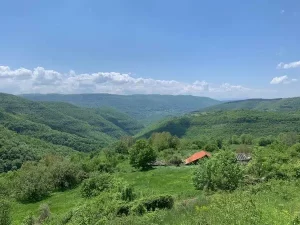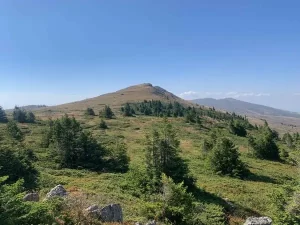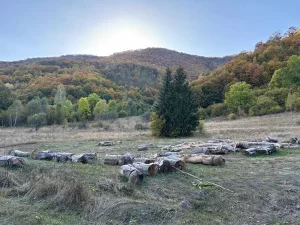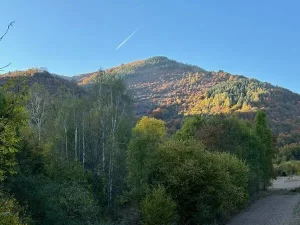Rewilding Stara Planina
are being restored
people positively impacted
trees being planted
tonnes CO₂ to be captured
Project Summary
- Biodiversity
- ·
- Capacity development
- ·
- Education
- ·
- Forest restoration
- ·
- Reforestation
- ·
- Regenerative agriculture

Project area
Nestled within the majestic Stara Planina mountains of Serbia lies a European biodiversity hotspot, boasting a rich tapestry of wildlife with over 30 mammal and 200 bird species. Recently upgraded to National Park status, Stara Planina spans an impressive 114,332 hectares, securing its position as Serbia’s largest protected area. Beyond its ecological significance, this region is steeped in cultural heritage and home to a diverse array of autochthonous breeds.
The problem
For centuries, the Balkan Peninsula has relied on the traditional practice of transhumance for livestock production. However, the emergence of new state borders halted the large-scale migrations inherent to transhumant activities, necessitating a reorganization between lower and higher elevations. Unfortunately, post-World War II policies promoted the intensification of transhumance, resulting in premature grazing of lower-elevation grasslands and the abandonment of higher-elevation areas. These shifts have contributed to land degradation, erosion, and the proliferation of undesirable plant species, ultimately leading to a decline in biodiversity across the region.
What the project does
Our collaborative project is dedicated to developing a landscape-level restoration effort that focuses on rejuvenating mosaic forests and semi-natural grasslands through regenerative grazing practices. By harnessing the power of nature’s own mechanisms, we aim to reinvigorate natural dynamics, enhance biodiversity, and bolster the productivity of rangelands. Furthermore, the project will improve connectivity among fragmented habitats, amplifying the effectiveness of conservation efforts within the park. In addition to our conservation activities, the project will foster sustainable development opportunities for local communities. Through the promotion of ecotourism initiatives and local products, we aim to boost livelihoods based on the natural splendor of Stara Planina.
The project has 3 focus areas:
- Rewilding of degraded landscapes
Restoration of degraded areas and reintroduction of native herbivores and natural, regenerative grazing to areas which were overgrazed or abandoned and where biodiversity loss is the highest. Large herbivores aid in seed spreading and germination and control of wild fires and invasive plant species. - Reforestation
Reforestation of degraded landscapes through native trees with water management techniques, as a local nature based climate mitigation solution. - Growth of rural entrepreneurship
Expansion of rural tourism beyond accommodation towards outdoor recreation activities. Utilization of regenerative agriculture for land restoration and business development at lower elevation sites with road access.
Through ecosystem restoration, the project aims to increase the populations of endangered species, including ground squirrels and Griffon vultures.
Aligned with SDGs 1, 8, 11, 13, 15 and 17, the project conducts 5 activities: Collaborative Surveys, Training, Baseline Study, Restoration, and Livelihood Development. A collaborative survey facilitated by key stakeholders provided insights into ecological conditions, restoration opportunities and livelihood dynamics.
Join us as we embark on this transformative journey towards ecological restoration and community empowerment in Stara Planina National Park!
Project Gallery
